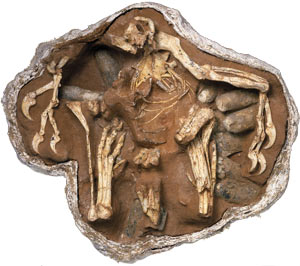Are there any living species that scientists believe are the direct ancestors of other living species? Macro-evolution works by a beneficial genetic mutation that gets passed along to the offspring, right? But I would think that in at least some cases the original species would not be wiped out by the species with the genetic mutation. If no living species is the direct ancestor of another living species, I see this as a big problem, because when you consider the great number of species, mathematically, not every single original species would die out. Can scientists prove with genetic testing if one species is the ancestor of another?
I may be covering what other people have said, as I have not read through this thread before replying...
Animals evolve to adapt to their environment. If the environment doesn't chage, then the animal will not evolve. After all, if the animal is well suited to the environment it lives in, then it doesn't need to change.
To specify, the change is caused by evironmental pressure. For example, a wolly mammoth in a tropical rainforest will be under pressure because the environment is different to that which the mammoth is adapted for. Thus variations in the mammoth population will be either well suited or not suited to the environment. Over time (if we could live long enough) we would see the mammoths lose their wolly coat and become adapted to life in the tropics. A tropical mammoth, if you will. This is a very simplified version of how evolution works to change one species into another.
To use this analofgy to answer your question, it is very rare to find an animal and a species that evolved from it both alive today. This is because of the environmental changes that caused the animal to change. We wouldn't see the wolly mammoth of the above example living with the adapted tropical mammoth, because the tropical mammoth (being better adapted to survive in the tropical environment) has competed with the wooly mammoth and driven it to extinction.
This happens in nature very often. When we look at a single environment, we don't really see different species of animals that compete for the same resources. One species will usually compete with the other and drive them to extinction. We can see similar species in similar environments, but they do not live near each other. An example of this is the emu and the ostrich. Both are very similar looking large flightless birds that live in arid areas, but the ostrich is native to Africa while the emu is native to Australia.
Regarding your question about whether species alive today are related from species that lived in the past and are now extinct, the fossil record certainly does show how animal species have developed. A good example is the evolution of the horse. The
Wiki article on it explains it in much better detail than I can in this post.
Another problem I have is that we have never seen a beneficial macro genetic mutation. How many years should we wait without seeing this before we start to seriously doubt the theory? When we consider the rate of change from single celled organisms to humans and lions, when would statistically expect to see this? Let's give a starting date on when our observation of the environment was sufficient to expect to see this and count from then. Are we talking 200 more years? 500? I don't know, I'm looking for someone to tell me.
The changes that occur in evolution may take a small amount of time geologically speaking, but it is still many centuries at the very least. However, we have seen some examples of evolution, such as bacteria which have developed the ability to break down and gain nutrients from compounds which only apeared due to industrial activity by man.
That brings me to my next question. Is evolution falsifiable or verifiable as a theory? Newton's theories are now laws, relativity is not a law instead of a theory, so what findings would make evolution make that leap? And what findings would make scientists reject the theory?
yes, evolution, like any good scientific theory is easily falsifiable. A 600 million year old fossil rabbit would do the job quite nicely.
What do you think about the Pre-Cambian (I think that's the right term) explosion?
You are refering to the
Cambrian Explosion. This was a sudden appearance in the fossil record of a large number of different animal types where there had previously been very few. it is easy to interpret this as the sudden appearance of a large amount of life on the planet, but an examination of the fossil record will show a different story.
When we look at the fossils found before the explosion, we see they are invertebrates such as jellyfish and other animals which are not fossilised easily. This means that there will be less fossils of these animals, even though they may have been quite common. After the explosion, animals had developed body structures that were more easily fossilised, meaning it was easier for them to become fossilised, thus fossils of them are more common, even though the actual populations of animals at the time may not have changed dramatically.
In short, the Cambrian explosion doesn't reflect an increase in the amount of life present, it reflects an increase in the amount of life that could be easily fossilised.



